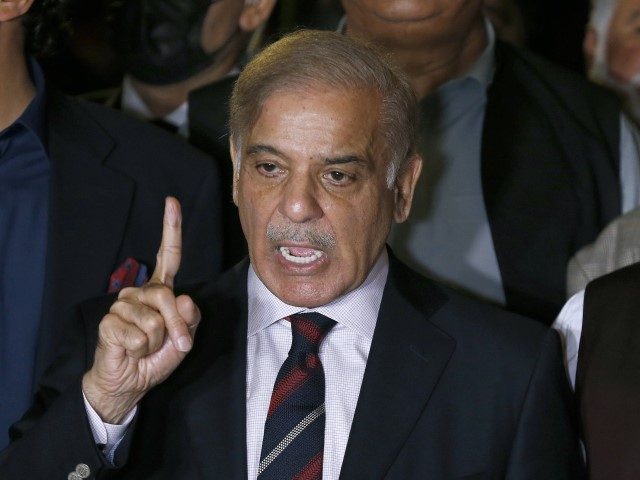The Parliament of Pakistan speedily elected Shehbaz Sharif, younger brother of former Prime Minister Nawaz Sharif, to replace the ousted Imran Khan on Monday.
Lawmakers from Khan’s Pakistan Tehreek-e-Insaf (PTI) resigned from the lower house of parliament en masse to protest the vote to put Sharif in the prime minister’s office.
Khan was pushed out with a no-confidence vote on Sunday in a marathon 13-hour session of parliament. This maintained Pakistan’s unenviable 75-year streak of never allowing a prime minister to complete his term, although Khan is the first to lose his office after a vote of no confidence.
The vote was close when 174 lawmakers voted to remove Khan from office, two more than necessary. The PTI attempted to stall the vote by repeating Khan’s claim that the government of the United States was staging a legislative coup against him.
Less hysterical observers noted that Khan lost the support of almost everyone outside PTI by mismanaging economic policy and foreign policy, and perhaps most crucially losing the support of Pakistan’s powerful military establishment.
Sharif stood for election unopposed after PTI lawmakers announced their resignations to boycott the vote, knocking Sharif’s chief rival Shah Mahmood Qureshi out of contention.
Sharif, one year older than the 69-year-old Khan, is the brother of 72-year-old Nawaz Sharif, who served three terms as prime minister (none of them to completion, in accordance with Pakistani political tradition — his final term ended in 2017 when he was forced to resign by a corruption investigation).
Nawaz Sharif, who has been living in London since 2019, released a statement through his Pakistan Muslim League-Nawaz (PML-N) party on Sunday saying he was “happy” about Khan’s removal from office.
A crowd of Sharif supporters assembled outside of his London residence to share his happiness on Sunday, but they were met by a decidedly unhappy crowd of PTI supporters and the police were obliged to step in and separate them.
A senior PML-N official said on Monday that Nawaz Sharif would return to Pakistan after the Muslim holiday of Eid next month to face the remaining court proceedings for his corruption allegations. He was permitted to move to London for medical reasons in 2019.
Shehbaz Sharif is the former chief minister of Punjab, the most heavily populated province in Pakistan. He developed a reputation for efficiency, business acumen, and a “can-do” leadership style. His first term as Punjab chief minister was interrupted by a 1999 coup whose leader, Gen. Pervez Musharraf, took control of the entire country and forced most of the Sharif family into exile. Shehbaz Sharif returned to Punjab in 2007 and went on to become the longest-serving chief minister of the province.
Khan and his supporters loathe the Sharif dynasty, which is haunted by widespread allegations of corruption. Shehbaz Sharif was indicted for money laundering by Khan’s government in September 2020 and is technically still out on bail pending trial.
Sharif has good relations with the Pakistani military, give or take one coup 23 years ago. According to Sharif, there were no hard feelings even at the time because Gen. Musharraf offered to make him prime minister, but he declined.
Sharif also has good relations with Communist China, Pakistan’s powerful patron. As chief minister of Punjab, he was applauded for overseeing the completion of several large Chinese Belt and Road Initiative (BRI) projects. Sharif said on Monday he would prioritize the completion of BRI projects in Pakistan.
Chinese state media said on Monday that “cooperation between the two countries could be even better than under Khan,” who was dismissed as an insincere partner for Beijing because he opposed Belt and Road’s $60 billion China-Pakistan Economic Corridor (CPEC) early in his career. Khan’s recent fulsome praise for Chinese dictator Xi Jinping, and even his support for China’s oppression of the Uyghur Muslims, did not earn him much of a fond farewell from Beijing.
Pakistan’s regional rival India ventured some cautious optimism for Sharif as well. India-Pakistan relations hit rock bottom under Khan’s tenure, but Sharif said on Monday he looked forward to “good relations with India,” provided the situation in the disputed province of Kashmir is resolved.
“I’ll advise [Indian Prime Minister Narendra] Modi to understand that there is poverty on both sides. I call upon Modi to come and resolve the Jammu and Kashmir issue and then let’s fight poverty together,” Sharif said.
Sharif dismissed Khan’s theories of a foreign-backed legislative coup as nonsense and offered to resign if Khan can prove his allegations. PML-N officials said they envisioned Sharif’s tenure as temporary in any event, an interim administration until elections can be held later this year, when they hope to have electoral reforms in place.

COMMENTS
Please let us know if you're having issues with commenting.